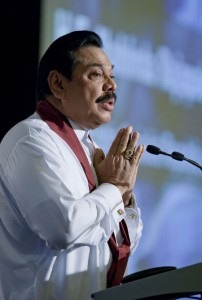 The United Nations Human Rights Council (UNHRC) are expected to consider a motion tabled by the United States on Sri Lankan accountability for war crimes later this month, nearly three years after the end of the island nation’s bloody civil war between the government and the Liberation Tigers of Tamil Eelam (LTTE), a secessionist rebel militia.
The United Nations Human Rights Council (UNHRC) are expected to consider a motion tabled by the United States on Sri Lankan accountability for war crimes later this month, nearly three years after the end of the island nation’s bloody civil war between the government and the Liberation Tigers of Tamil Eelam (LTTE), a secessionist rebel militia.
The government has been accused of multiple atrocities committed during its war effort in 2008 and 2009, including intentionally shelling thousands of civilians in a “no-fire zone”, extra-judicial killings, torture, enforced disappearances and attacks on civilian infrastructure including hospitals .Estimates are that between thousands and tens and thousands were killed in the endgame of the fighting.
President Mahinda Rajapaksa’s administration initially responded to such allegations by denying all but of late have peregrinated toward greater openness. It has moved on from echoing the president’s claim that “not one civilian was shot dead” toward acceptance of the government-appointed “Lessons Learnt and Reconciliation Commission” (LLRC) panel’s findings that large numbers were killed.
This may be a sign of some progress, but the conclusions of theinternal investigation- which unsurprisingly exonerates the government of responsibility for suchalleged abuses, citing “crossfire” and other factors- contraststarkly with the views of authoritative external assessments. The report of a United Nations panel last year found“credible allegations of serious violations committed by the Government, including killing of civilians through widespread shelling”, and by other means of violence.
The UN high commissioner for human rights, Navi Pillay, stated after the report’srelease that “addressing violations of international humanitarian or human rights law is not a matter of choice or policy; it is a duty under domestic and international law”-duty or not, Sri Lanka have blocked any international inquiries to date and will try to do so again later this month.
The UN’s findings, reinforced by reports from human rights groups such as Amnesty International and international media which have included video footage of executions are all of a piece, according to apologists. They posit a malicious anti-Sri Lankan campaignby LTTE sympathisers who have duped / bought off the western media (apparently I’m in on it too, according to my trolls) in order to damage the country and intimidate itsleadership.
Unfortunately, some of the rebuttals provided by officials to disputethe more compelling evidence have onlyfurther damaged the credibility ofthe government’s rejectionist stance. After Channel Four broadcast an alleged “trophy video” of Sri Lankan forces executing unarmed men in 2009, a panel of domestic experts investigated the footage and declared that they had “scientifically” proven that it was a fake assembled most likely by pro-LTTE conspirators, and listed their objections.
In response, Philip Alston, Special Rappourteur for Summary, Arbitrary or Extra-judicial killings at the UNissued a point-by-point refutation of the Sri Lankan panel’s findings, drawn from the conclusion of world-leading experts in forensic pathology, forensic video analysis, and firearm evidence. Receiving the backing of Alston’s successor Christof Heyns, the case for the authenticity of the video ishard to doubt.
It has been around a thousand days since the conclusion of the war. In that time the response of the government to allegations of abuses, up to and including the LLRC report have been unconvincing,redolent of political self-servicerather than an authentic attempt at truth andreconciliation. It is telling that the only senior member of the government or armed forces jailed over war-related charges has been the former commander of the army, Sarath Fonseka, for accusing the defence secretary of ordering atrocities behind his back. Interestingly, Fonseka’s claim is supported by statements fromtwo othermembers of the army: see here and here.
As for the old cant that the mound of(inadmissible) evidence against the governmentissues from conspiratorial Tamil expats, even the most ardent patriots who instinctively rally to Rajapaksa must grow weary of reflexive cries of “lies and propaganda!”every time new allegations surface. It is obviously a very convenient deflection for the government to use ad infinitum, and cannot stop Sri Lankans from questioning the official narrative as they sober up from the war victory’s patriotic afterglow;as any doctor will advise, any panacea’s placebo comforts dim with overuse.
For this reason, among many others, Sri Lanka should allow for an independent inquiry into crimes that are alleged to have occurred during the endgame of the war- to decisively prove the inference of its representatives that there is nothing to hide.
Having said that, here’s a thought: if America can table such a motion and expect a response, why shouldn’t the armed forces of Tommy “we don’t do body counts” Franks, and all Bush’s men not expect the same over, say, certain events in Fallujah, Haditha or the lawfulness of the entire Iraq war?And doesn’t Sri Lanka’s failure to self-examine convincingly mirror Britain’s pathetic Hutton or Widgery reports?
Sri Lanka must be held open to international scrutiny for its alleged war crimes- Britain and America too.
(For updates you can share with your friends, follow TNN on Facebook and Twitter )
